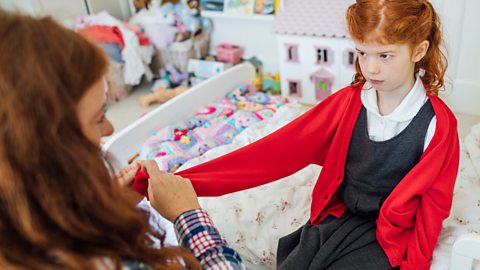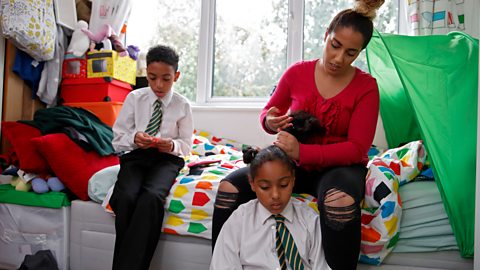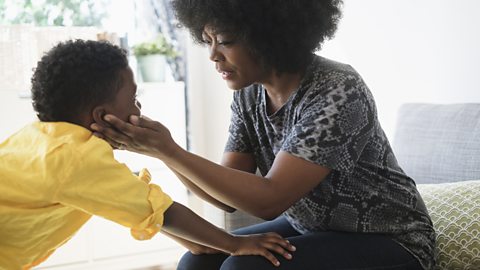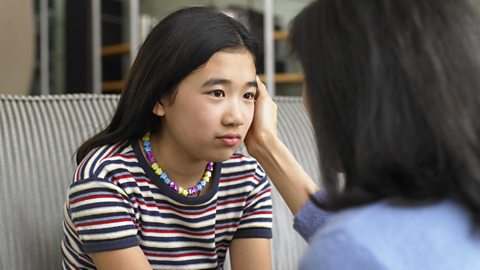Going back to school is often an anxious time for children and parents. Whatever your child's circumstances over the last term, returning to school will mean once again getting used to social interaction, being away from parents and learning in a classroom.
Here with some top tips to help parents - and children - navigate this period of adjustment are Dr Fiona Flinn - a child, adolescent and educational psychologist based in Belfast, and Rachel Vora - a school counsellor, psychotherapist and member of the British Association for Counselling and Psychotherapy.
So, how can you help your child adjust to the school routine again, with as little stress as possible?

Talk to your child

тEncourage your child to have conversations about the return to school.т
Rachel Vora, school counsellor
Dr Fiona Flinn says: тWith little ones, make three jars of small, medium and big worries and talk through them. You might also have a designated worry time scheduled into their day, to get it off their chest. Then once worry time once is up, we let go of it. Then theyтre starting to learn how to control their anxiety rather than the anxiety controlling them.т
Rachel adds: тChildren that find it difficult to talk may want to write it down, do a тwalk and talkт or use colours, animals or numbers to тrateт how they feel. For example, тIf ten is excited and one is not excited at all, what number do you feel about returning to school?тт
Listen to your children

Rachel reminds us: тActively listen to their response, without interrupting or trying to offer a solution. If children feel listened to, theyтre more likely to voice how they are feeling.т
Fiona adds: тThereтs a tendency in adults to cheer them up, but donтt jump to that and dismiss their concerns. By accepting and validating how theyтre feeling, an empathetic response can help regulate a young child. They feel heard and understood.т
Work collaboratively with your child to find a solution

Rachel says: тYou are helping them to feel more in control.
тAfter acknowledging any negative emotions, encourage your child to practice thinking positively. For example, тWhat are three positive thoughts about returning to school? What are you most grateful for at the moment?т And remind them of their resilience and give examples of when they have overcome challenges.т
Plan and prepare with them

Rachel suggests: тSetting mini tasks in the days leading up to school. For example:
- Packing their school bag
- Going to bed and waking up at the same time as a school day
- Planning what they will eat for breakfast, their packed lunch, etc
- Getting their uniform ready
- Speaking to friends prior to returning to school
- Arranging what time to get the school bus
- Driving the school route.т
Fiona says: тTell them how youтll walk them to the gate, give them a hug and put a treat in their bag. Make a routine with the kids and practise it. Make sure itтs fun and about connection and positivity.
тAnd in the days leading up to the return to school, get outside and get active. This will activate and energise their bodies, which might be flooded with stress hormones.т
Help them deal with separation anxiety

Fiona says: тTransitional objects can be a useful tool for younger children - like bringing something with them that belongs to mum or dad. Or draw a heart on your hand and theirs and say, тthatтs our hug heart - when I press that Iтm sending you a hugтт.
Rachel continues: тPrepare for your child to be emotionally and physically exhausted at the end of the first week. Therefore, if possible, try to delay starting after school activities or breakfast clubs to make the days more manageable.
тIf your child is particularly anxious about their return, inform the schoolтs pastoral team. Establish a тlink personт that your child feels comfortable to seek out if they are struggling during the day. You could also request a тTime Outт card for your child in class to give them an option to have a breather if they are feeling overwhelmed.т

More help as children go back to schoolтІ
ТщЖЙдМХФ Bitesize has lots of great ways to help parents help their child with their learning at primary and secondary school age.
In this article, illustrator Rob Biddulph shares how to use notes and messages to help your child face back-to-school nerves
For some children going back to school can cause anxiety. Read here for support and advice on тafter-school restraint collapseт, how to tackle anxiety and emotionally-based school avoidance
For first timers - Starting Primary School and Starting Secondary School are two collections lots of advice - aimed at parents of children about to enter a new school.

More from ТщЖЙдМХФ Bitesize Parents' ToolkitтІ
Parents' Toolkit
Fun activities, real-life stories, wellbeing support and loads of helpful advice - we're here for you and your child.

Five ways to build your childтs resilience
Psychology expert Dr Sandi Mann has some advice to help your children adjust to change and deal with anxiety.

How to support your child through difficult behaviours
Life coach Aisha, who supported the young candidates on Idris Elba's Fight School, explains how parents can avoid rows and start productive conversations.

Michael Mosley: Five tips for helping your kids sleep well
Dr Michael Mosley offers advice on improving health and concentration through better sleep habits. Here are his tips for parents to help their kids.

Five ways you can help boost your childтs confidence this summer
Educational psychologist Lee Randall has some tips to help you nurture your childтs confidence.

Paddy & Christine McGuinness - Our Family and Autism: Advice for parents
Paddy and Christine McGuinness have 3 autistic children - their experiences may help parents who're looking for, or have received, an autism diagnosis for their child
